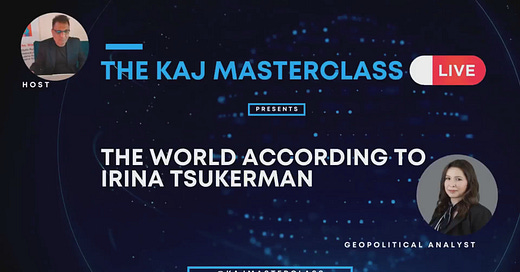The recent escalation between India and Pakistan following terrorist attacks has revealed much more than a bilateral conflict. As geopolitical analyst Irina Tsukerman explained in a recent interview, this crisis showcases a complex interplay of strategic responses and international maneuvering that could reshape regional security.
The Immediate Crisis
India's recent strikes on nine terrorist sites in Pakistan represent the most significant military action between these nuclear powers since 2019. The Indian government was careful to emphasize that it targeted only terrorist infrastructure, not Pakistani military installations.
What's most concerning about this situation isn't just the immediate violence but, as Tsukerman points out, the evidence suggesting these attacks were potentially just "a test for something bigger." The similarities between these recent incidents and the 2008 Mumbai attacks indicate a troubling continuity in Pakistan's shadow intelligence networks that have remained intact despite multiple changes in government leadership.
Pakistan's Internal Contradictions
Pakistan's approach appears contradictory from a national interest perspective. The country is already $20 billion in debt to China alone, and continued terrorist activity undermines potential economic investments. Yet the intelligence and military establishment continues supporting extremist networks against India.
Why? According to Tsukerman, power preservation is the driving force. The shadowy intelligence networks operating beneath Pakistan's surface politics remain largely unchanged despite the rotation of "corruption-ridden prime ministers." These networks effectively play both sides in regional conflicts, sometimes acting against Pakistan's own national interests for financial gain or to consolidate power.
The Global Chess Game
What makes this conflict particularly dangerous is its evolution into a transnational problem with multiple international stakeholders:
The United States
The Trump administration has expressed concern about escalation but may be missing an opportunity for stronger diplomatic engagement. Tsukerman suggests a high-level visit to India would have been a powerful gesture of solidarity, similar to U.S. responses following attacks on Israel. Meanwhile, reported cuts to human intelligence capabilities raise questions about America's preparedness to handle multiple simultaneous crises.
Russia
Putin's Russia maintains economic interests in India while strengthening ties with Pakistan. This balancing act appears increasingly tilted toward disruption rather than stability. Russia, having depleted significant resources in Ukraine, "is now looking to weaken others as much as possible to level the playing field," functioning more as "an agent of chaos than a party looking to establish equitable economic cooperation."
China
Xi Jinping's increasingly aggressive and nationalistic policies make China a particularly concerning player. While maintaining economic relationships with India, China benefits from any disruption to India's stability or investment climate. Rather than direct confrontation, China appears content to "tip the scale slightly" through indirect means, supporting actors who cause destabilization.
Turkey, Qatar, and the "Islamist Quartet"
Turkey's expansionist agenda, alongside Qatar's financial backing, represents another dimension of foreign interference. These nations have actively equated Kashmir to the West Bank and Gaza, considering Kashmir Pakistani territory and providing political and potentially logistical support to extremist networks.
Israel
Israel has recognized the parallels between threats it faces and those confronting India. Israeli officials have publicly acknowledged "this is the same problem with the same players and needs to be tackled jointly." The cooperation between India and Israel will likely continue growing beyond counterterrorism to include education, media, and people-to-people relations.
The Hamas Connection
Perhaps most alarming is the evidence of Middle Eastern extremist groups directly aligning with terrorist networks targeting India. Tsukerman highlighted that Hamas operatives have been meeting with these groups, sharing methods and "best practices" for at least a year before the attacks. This indicates a troubling sophistication and international coordination among terrorist organizations.
The Real Danger
While nuclear escalation dominates headlines, the more realistic threat may be hybrid warfare expansion involving cyber attacks, legal battles, and propaganda campaigns. Even more concerning is the potential for extremist cells operating semi-independently throughout India, preparing for larger coordinated attacks.
The most insidious strategy, however, may be efforts to cause internal divisions within India itself. Foreign actors investing in religious activities, cultural initiatives, and soft power projects often simultaneously work to "radicalize groups and more importantly than just radicalization, cause distrust and divisions between communities." This internal chaos can be a more powerful weapon than direct terrorism.
Looking Forward
For India, the path forward requires multilateral counterintelligence efforts and vigilance against both external threats and internal division. The international community must recognize the complex web of motivations driving this conflict beyond the immediate India-Pakistan dynamic.
As world powers maneuver for advantage, the people of both nations remain caught in a dangerous game where terrorism serves as just one piece on a much larger geopolitical chessboard. The stakes couldn't be higher for regional stability, and the consequences of miscalculation could reverberate far beyond South Asia's borders.
Watch the full interview on YouTube
This article summarizes insights from geopolitical analyst Irina Tsukerman's recent interview on India-Pakistan tensions and their global implications.












Share this post